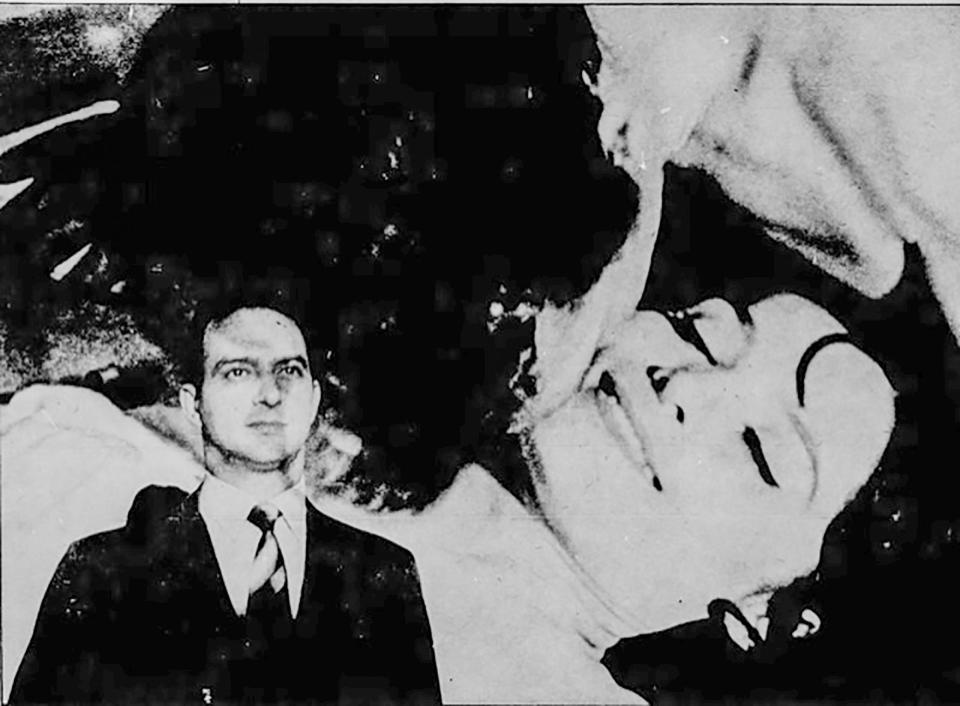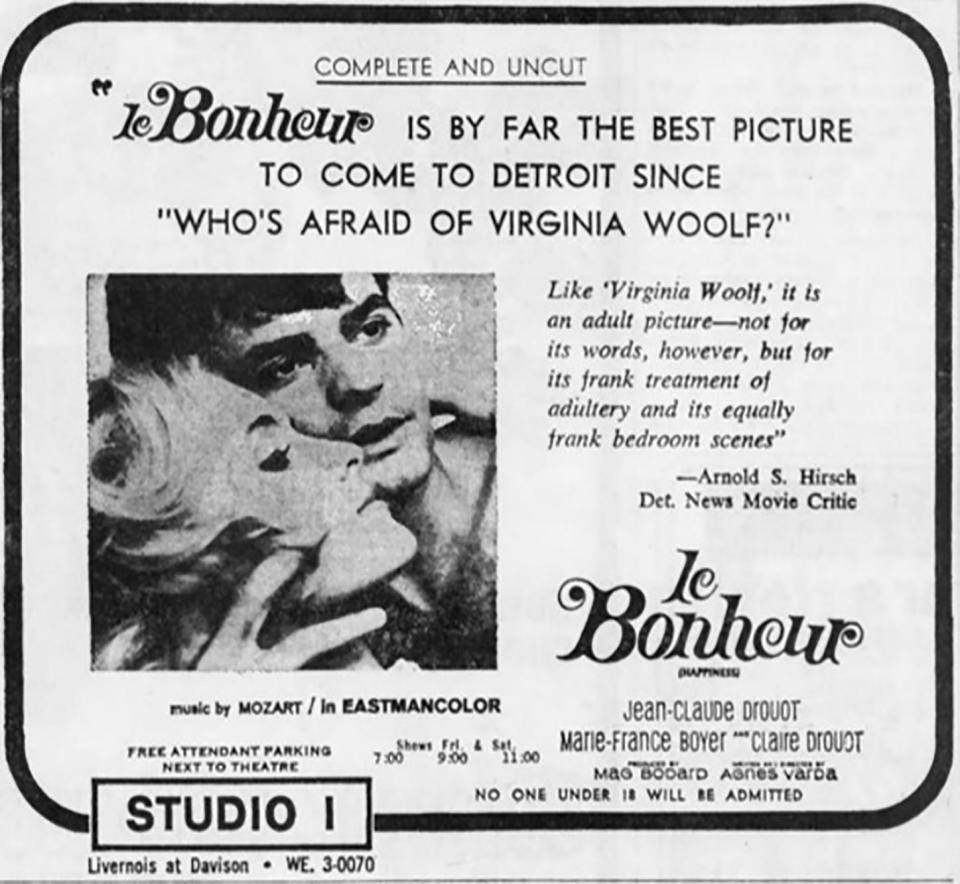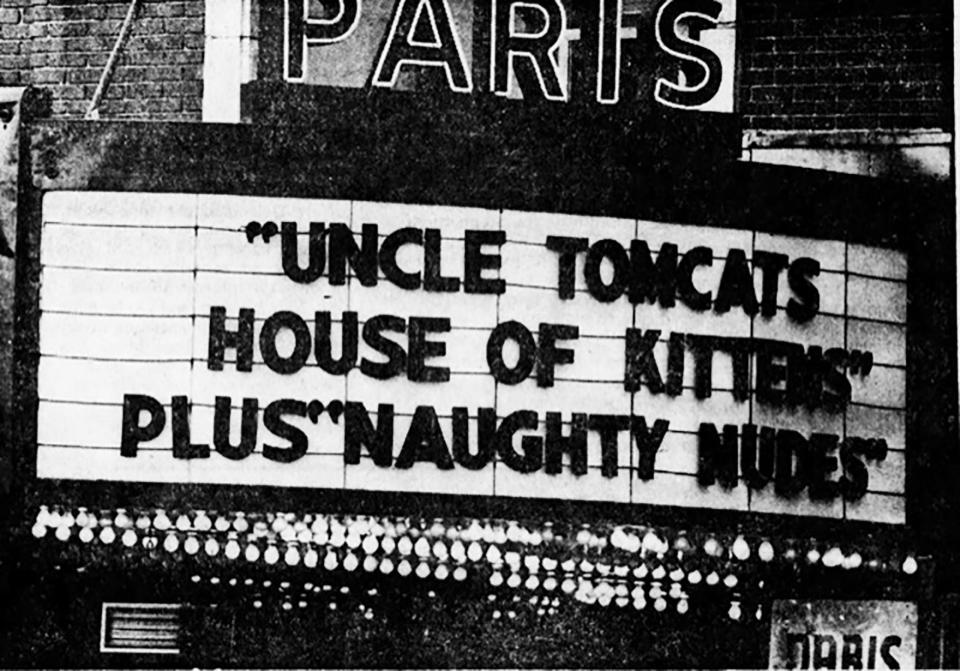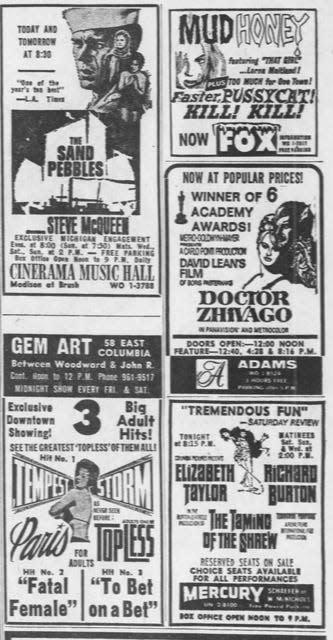Flashback: Detroit police once censored movies. How that practice eventually ended.
For decades, officers in the Detroit Police “obscenity detail” monitored every movie shown in the city, banning some films and ordering sections of others trimmed before they could be shown commercially. By the late 1960s, with court rulings and community standards shifting, police censors found themselves with less to do. This article was published on Aug. 13, 1967.
During one week in March this year, "The Bible" and "Hawaii" each did $20,000 worth of business, "Blow-Up" (with well-publicized nude scenes) took in $16,000, "Grand Prix" did $15,000 and "The Sand Pebbles" managed $12,000.
But the box office champ of the week was a movie called "The Aroused," which drew an astonishing $28,000 at the Fox Theater, where Detroit police permitted it to be shown after manager Bill Brown agreed to cut out some 20 minutes of film which the police considered obscene.
The deleted portions, according to a file kept by the Police Department's obscenity detail in the Liquor License Bureau, included scenes of "perversion" and fondling of the nude body and other explicit scenes police said "exploited" sex.
The film’s ads promised a lot of sex, but such ads are routine for sexploitation films, many of which deliver very little. The word got around, however, that "The Aroused" was different — plenty of nakedness and salacious activities even after the police put down their scissors.
Sgt. Joseph Joabar of the obscenity detail was amazed. Not only by the film's smash-hit popularity, but: "We didn't get a single complaint," he said. "How could we say that this kind of film is offensive to the public's standards?"

He was referring to the U. S. Supreme Court definition of obscenity, which the police use as their guide, the landmark Roth decision of 1957. It says that to be obscene, material must, among other things, be patently offensive because it affronts the contemporary community standards.
How standards have changed
The question of community standards is only one thorny tree in a foggy forest, but it's also the biggest. Detroiters can now see films in public theaters that 10 years ago they might have been arrested for having in their private possession. And the main reason has been the vast change in public attitudes toward sex.
The courts have done the work, but the temper of the times made it possible. The voices of the anti-censors have been more vigorous, more listened to and more successful than their opponents.
In 1962, the Italian movie, "Two Women," starring Sophia Loren, canceled a Michigan Theater booking because Detroit police would not give it a permit unless the rape scene was deleted. The distributor, Embassy Pictures, refused to cut it. Two years later, the film played the Adams Theater uncut. This year, it appeared on television.
In 1961, the word "bastard" was cut twice from "Tunes of Glory" in order to get a Detroit permit. It was recently seen on television with the word intact both times.
Foreign films that deal frankly with sex and such formerly taboo themes as homosexuality and abortion are the kind of films that broke American censorship practices and started the liberal trend in the first place. They now flicker past the vigilant eyes of the obscenity detail without a single cut.

"Le Bonheur" from France, "Knife in the Water" from Poland and "Dear John" and "Loving Couples" from Sweden are the only recent films that even came close to being censored. In each case, the exhibitor appealed and in each case was in the end permitted to show the film uncut, though restricted to moviegoers 18 or older.
Why can 'Take Me Naked' be shown?
In addition to these art films, which can more or less back up their claim of portraying sex candidly for purposes of realism, there are the "art" films like "Take Me Naked" and "The Love Merchants" that show at such theaters as the Gem Art, the Variety and the Guild.
These are unabashedly voyeuristic films made with no other purpose than to titillate. They have largely replaced nudist camp epics and other "nudies" at most of the "art" houses. Made by an "underground" much different from Andy Warhol's, they're cheap films so lacking in quality that they have to be seen to be believed.
They have a flimsy pretext of a plot or a bit of trumped-up moralizing superimposed on the nudity that their viewers go to see, so that everyone can say they avoid the other two parts of the Roth decision's definition of obscenity.
These two parts are: 1) That the dominant theme taken as a whole appeals to a prurient interest in sex; 2) That the material be utterly without redeeming social value.

These are the only kinds of films that the Detroit police are currently asking exhibitors to trim.
"The change has been tremendous," notes Patrolman Edward Marks, who for 17 years has been one of the police censors deciding what's OK for Detroit moviegoers to see.
Marks says the first nudity permitted on a Detroit screen was in a movie called "Garden of Eden," which got a permit 10 years ago.
"That was the wedge that opened the door to progress," said Marks, sounding as if he wasn't very sure it was all progress.
Since then, the Fox Theater, the second-largest movie house in the United States, has switched from losing money on general-release Hollywood movies to a profitable operation of showing horror movies, exploitation films (based on such controversies as the race issue), shock-effect documentaries like "Mondo Cane," and sexploitation films like "The Aroused."
From the Free Press archives: Meet the man who served as the ‘voice of the Detroit River’ for 58 years
'Detroit City': The story behind the Bobby Bare's classic
Drawing the line … somewhere
Even Hollywood is riding a big nudity boom. "Hawaii" has scenes showing native girls naked to the waist and the Detroit police never even blinked. Movie theater owners agree that the Detroit police have become far more broad-minded lately, especially since the obscenity detail was reorganized about a year ago.

Although courts have ruled that they, themselves, are the final arbiters, in practice it's really the police — especially in Detroit, the only big city besides Chicago that still has a movie censorship setup.
The police can't go by their own standards, says Sgt. Joabar. They must go by the community's. But how do the police decide what the community's stands are?
If the Fox Theater could do twice as much business by showing "The Aroused" uncut and still not receive a single complaint, would the police go along?"
Not likely. They still feel it's their duty to draw the line somewhere. Even though the city ordinance under which they operate is considered unconstitutional. A new one being drawn up is not yet in effect.
So where do they draw the line?
The Supreme Court, to clarify its Roth definition (or so it thought), said that neither nudity nor sex by itself is necessarily obscene.
“It’s the way nudity is presented," says Sgt. Joabar. "We take into account the context of the entire film. It has to appeal to prurient interest. If sex is exploited, then it's obscene."
Well, then, overlooking the fact that "art" movies obviously exploit sex, what does it all mean in terms of what the police see but the public doesn't?
"Each film is judged separately," says Sgt. Joabar, more or less evading the question.
But when he's pinned down and his file of permits is examined, it turns out that they generally draw the line at scenes showing a fraction too much nudity below the waist, a nude woman in contact with a man, burlesque-type "bumping and grinding" or excited writhing, any kind of preliminary sex play, and unmistakable signs that "perversion" or other unreserved erotic activity is going on.
This article originally appeared on Detroit Free Press: Detroit police used to censored movies. How that eventually stopped.

